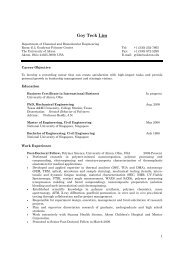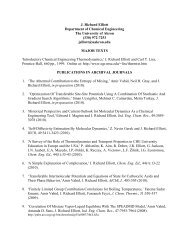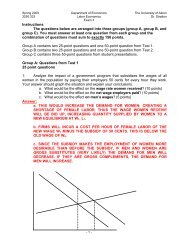Sociology of the Anarchists - Gozips.uakron.edu - The University of ...
Sociology of the Anarchists - Gozips.uakron.edu - The University of ...
Sociology of the Anarchists - Gozips.uakron.edu - The University of ...
You also want an ePaper? Increase the reach of your titles
YUMPU automatically turns print PDFs into web optimized ePapers that Google loves.
type <strong>of</strong> authority (particularly when it is practiced as an authority); <strong>the</strong> concept <strong>of</strong><br />
leadership has been challenging for contemporary North American anarchists, many <strong>of</strong><br />
whom assert “we have no leaders”; o<strong>the</strong>rs, like Jo Freeman 14 , who say this is little but a<br />
way to avoid accountability, and in <strong>the</strong> chaos allow an informal hierarchy to form. Thus,<br />
some anarchists say that leaders <strong>the</strong>mselves are not <strong>the</strong> problem, but <strong>the</strong> centralized <strong>of</strong><br />
leadership is. <strong>The</strong>refore group-centered leadership is more desirable. 15 Weber notes, and<br />
anarchists would probably agree, that charisma can be revolutionary, but leaders are<br />
mortal. <strong>The</strong> untimely deaths <strong>of</strong> Ghandi and King led to a leadership vacuum in <strong>the</strong> Indian<br />
and Afro-American liberation movements, vacuums that anarchists might ascribe to<br />
individual-centered leadership and not group-centered leadership.<br />
Ironically, in a review <strong>of</strong> Weber's <strong>the</strong>ory <strong>of</strong> authority, Blau (1963) states:<br />
<strong>The</strong>re is also an anarchistic streak in charismatic<br />
movements, a disdain for routine tasks and problems <strong>of</strong><br />
organization or administration, since <strong>the</strong> leader's inspiration<br />
and <strong>the</strong> sacred mission must not be pr<strong>of</strong>aned by mundane<br />
considerations. (Blau 1963, p. 308)<br />
Although Blau may be incidentally correct that <strong>the</strong>re is a “disdain for routine tasks” in<br />
some interpretations <strong>of</strong> anarchism, <strong>the</strong> whole premise is faulty. Using anarchism (which<br />
he does not do, explicitly) to describe charismatic authority (or even vice-versa) is ra<strong>the</strong>r<br />
contradictory, since anarchism refutes <strong>the</strong> charisma <strong>of</strong> individual leaders and does not,<br />
per se, reject organization. Indeed, two <strong>of</strong> <strong>the</strong> most well-known North American anarchist<br />
<strong>the</strong>orists, Noam Chomsky and John Zerzan, wholly reject <strong>the</strong> suggestion that <strong>the</strong>y are<br />
charismatic leaders or idols <strong>of</strong> <strong>the</strong> anarchist movement. 16<br />
Finally, legal-rational authority is <strong>the</strong> embodiment <strong>of</strong> authority in predictable standards.<br />
Authority derives from <strong>the</strong> position <strong>of</strong> <strong>the</strong> individual, not <strong>the</strong> individual itself<br />
—“President” Bush is not powerful because he is George Bush, but because he is<br />
[conventionally, at least, not by merit <strong>of</strong> actually winning <strong>the</strong> 2000 election] President <strong>of</strong><br />
<strong>the</strong> United States. Thus, in <strong>the</strong>ory, those in power are under <strong>the</strong> auspice <strong>of</strong> laws and rules,<br />
unlike charismatic or traditional authority where leaders are not beholden to anything<br />
except <strong>the</strong>mselves or traditional institutions (which <strong>the</strong>y can interpret). Charismatic<br />
authority can become institutionalized (especially after <strong>the</strong> passing <strong>of</strong> a leader—such as<br />
Jesus Christ) into a legal-rational form. <strong>Anarchists</strong> are also at odds with this brand <strong>of</strong><br />
authority, since it lends itself to slow change, monolithic behavior, a lack <strong>of</strong> local<br />
autonomy, and a strong tendency towards bureaucratization (which anarchists view as a<br />
main, anti-social component in present-day capitalist states). As Blau (1963) notes:<br />
Democracy is subsumed under <strong>the</strong> legal order, although<br />
Weber makes it clear that a legal order is not necessarily<br />
democratic. On <strong>the</strong> contrary, <strong>the</strong> prototype <strong>of</strong> <strong>the</strong> legal order<br />
is autocratic bureaucracy. (Blau 1963, p. 314)<br />
14 Freeman c.1970.<br />
15 Crass (2001) writes favorably <strong>of</strong> SNCC's Ella Baker in this regard.<br />
16 Yet, as with charismatic leaders, Chomsky and Zerzan still do get devoted followers.<br />
[ Williams 17 ] [ this is a draft. do not cite. ]






